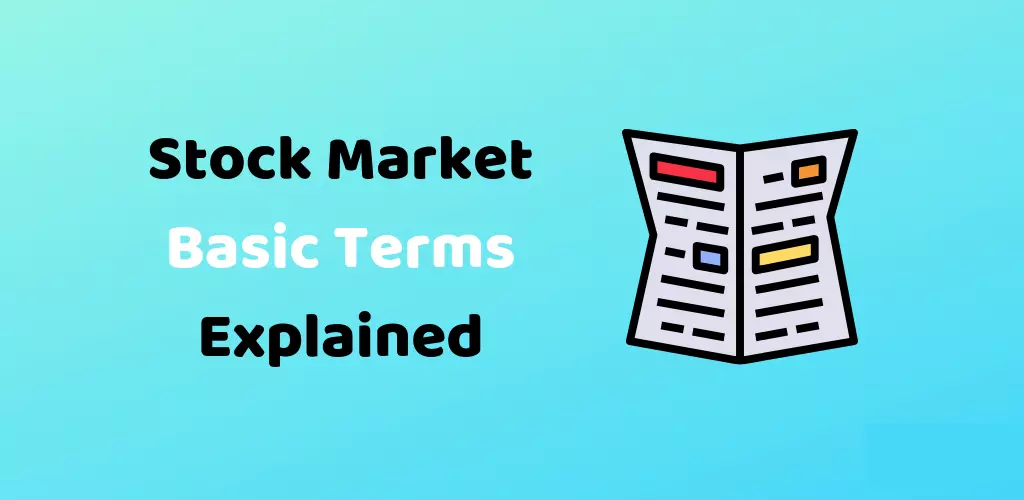Introduction : Stock Market Terminology
In this amazing article we will learn about most of the commonly used stock market terminology. These would help you to understand the market in a better way. We would go through a lot of important terms which will help a beginner trader or a stock market enthusiast immensely in the stock market. The knowledge of these terms will definitely make you a successful trader. Do consider book-marking our site for more such informative and awesome content in the future.
What Is The Stock Market?
What is the Stock Market? The stock market is made up of two main categories, stocks and bonds. There are differences between the two that set them apart from each other. Stocks represent a share of ownership in a company, while bonds represent debt owed by the government or corporations.
What Is A Stock?
What is a stock exactly? A stock (also known as equity) is generally a security that represents the ownership of a fraction of a Company.Stocks are bought and sold predominantly on stock exchanges( For USA: NASDAQ and For India: NSE) (though there can be private sales as well) and are the foundation of many individual investors’ portfolios.
Stock market is an area wherein equity stocks of organizations are offered and sold by the members (consumers and sellers of shares). The individuals can be investors and investors who are seeking for income over the short time or the long run. The investors specifically have a long-time period horizon and advantage from capital appreciation through the years. traders, but, look for quick profits via focusing at the small charge modifications in equity shares which ordinarily last for a few minutes for the complete buying and selling session.
What is a trading life cycle? The first step of the trading life cycle involves placing the order. It is followed by the matching and execution of the placed order. The clearing house of the stock exchange would then clear the trade. The final stage is the settlements which involves the pay in and pay out of funds and securities which takes place on the last day of the trade cycle.

Stock Market Terminologies
1. Annual Report
Annual reports inform shareholders about the company. It includes information like the company’s cash flow and management strategy. When you read an annual report, you’re judging the company’s solvency and financial situation.This is one of the very important stock market terminology.
2. Arbitrage
Arbitrage refers to buying and selling the same security on different exchanges and at different price points. If a stock trades at $10 on one exchange and $10.50 on another, you could buy shares for $10 and sell them for $10.50 on the other market. You’d pocket the difference as profits.
3. Averaging Down
Averaging down means adding to a losing position at a lower price. It increases your position size and lowers your average purchase price.
I call it adding to a loser and I don’t recommend it. If a stock goes against you, cut losses quickly!
4. Bear Market
A bear market refers to a market environment where a major index or stock falls 20% or more from its recent highs. It’s the opposite of a bull market. More on that term in a bit.
5. Beta
Beta is a measurement of a stock’s volatility compared to the overall markets.
The markets have a beta of 1. If a stock has a beta of 1.5, it means that for every 1-point move in the market, the stock moves 1.5 points. That means the stock’s more volatile than the market.
6. Blue-Chip Stocks
Blue-chip stocks are the stocks of large, industry-leading companies. The expression came from blue gambling chips, the highest-valued chips in casinos.
7. Bourse
This stock market term is a little murky. Technically, it’s another name for the stock market. It originates from a house where wealthy men gathered to trade shares. But in today’s terms, it usually refers to the Paris stock exchange or a non-U.S. stock exchange.
8. Bull Market
A bull market is the opposite of a bear market. It refers to a market in a prolonged period of increasing stock prices at least 20% above a recent low.
A single stock can be bullish or bearish too. So can a sector.
9. Broker
A firm or person who executes your buy and sell orders for stocks or other securities. A broker is a must for every trader. Learn how to choose your best broker here.
10. Bid
The amount of money a trader’s willing to pay per share for a stock. It’s balanced against the ask, which is what a seller wants per share of that same stock.
11. Close
The time the market closes. The major exchanges close at 4 p.m. Eastern, with after-hours trading continuing until 8 p.m.
12. Day Trading
Day trading is the practice of buying and selling a stock or security within the same trading day. This is my go-to trading strategy. Learn my patterns and strategies in this program.
13. Dividend
A dividend is a portion of a company’s earnings paid to shareholders quarterly or annually. Not all companies pay dividends. They’re especially rare for penny stock companies since they rarely have profits. This is also one of the very important stock market terminology.
14. Exchange
A place where investors and traders buy and sell stocks. The most well-known exchanges in the U.S. are the New York Stock Exchange (NYSE) and Nasdaq. I prefer to trade stocks that trade on the OTC markets.
15. Execution
When your buy or sell order completes, it’s called execution. If you put in an order to sell 100 shares, your order executes when all 100 shares are sold.
16. Haircut
A haircut can have two meanings. It can refer to a thin spread between the market maker’s bid and ask. It can also refer to the difference between a stock’s value and the amount a bank will recognize as collateral for a loan.
17. High
A high refers to a stock or index reaching a greater price point. A high can refer to a daily, weekly, or monthly high. Stocks near 52-week highs or all-time highs can be a bullish signal for traders.
18. Index
An index is a benchmark used as a reference marker for traders and investors. The Dow Jones Industrial Average (the Dow) and S&P 500 are examples of indexes.
19. Initial Public Offering (IPO)
An IPO is the first sale or offering of a stock by a company to the public. The Securities Exchange Commission (SEC) has strict rules for companies issuing an IPO.
20. Leverage
When you use leverage, you borrow capital from your broker with the goal of increasing profits. It’s one way to potentially increase gains — but it also increases losses. Don’t trade with leverage. Thus it becomes one of the very important stock market terminology.

21. Low
Low is the opposite of high. It represents a lower price point for a stock or index.
22. Margin
A margin account lets a trader borrow money from a broker to purchase a stock or asset. Margin is the difference between the loan amount and the securities price.
Margin trading is risky. If the trade goes south, you can lose significant cash. Read up on margin trading here.
23. Moving Average
A moving average is an indicator that shows a stock’s average price per share during a specific period. The 50- and 200-day moving averages are commonly used time frames.
24. Open
The start of the trading day. In the U.S., the stock market opens at 9:30 a.m. Eastern. Premarket trading begins at 4:30 a.m. Eastern. Note that there’s less volume in premarket and after-hours sessions.
25. Order
A trader’s bid to buy or sell a certain amount of stock. Brush up on order types here.
26. OTC Stocks
OTC stocks trade over-the-counter. They’re traded electronically but transactions are less transparent than the major exchanges. Companies listed on the OTC markets are small companies that don’t meet the major exchanges’ listing requirements. They can also be foreign companies.
27. Pink Sheet Stocks
Pink sheet stocks are the lowest tier of OTC stocks. They’re the sketchiest companies and they typically trade under $5 per share.
28. Portfolio
A collection of assets that makes up a trader or investor’s portfolio. You can have as few as one stock in a portfolio or an infinite amount of stocks or other securities.
29. Quote
A quote is a stock’s latest trading price. Stock quotes on free websites are usually delayed information. You may have to pay extra for real-time data.
30. Rally
A rally is a rapid increase in the general price level of the market or of the price of a stock. Depending on the overall environment, it can either be a bull rally or a bear rally. In a bear market, upward trends of as little as 10% can qualify as a rally.
31. Sector
A group of stocks in the same industry belong to the same sector. An example is the tech sector, which includes companies like Apple and Microsoft. Some traders prefer to trade in a specific sector, especially when sector momentum is hot.
32. Share Market
Any market where traders can buy or sell a company’s shares. The stock market is an example of a share market.
33. Short Selling
Short selling a stock is the opposite of going long. It’s a lot to cover in this post — read more about short selling here. In short (sorry, couldn’t resist), you take a trade where you believe the stock’s price will drop. I used to short sell. These days it’s an overcrowded and risky strategy. But that could change if the market crashes.
34. Spread
The spread is the difference between a stock’s bid and ask price. Say a trader’s willing to sell a stock for $10 and a buyer is willing to pay $9 for it. The spread is $1.
35. Stock Symbol
A stock symbol is an alphabetic symbol of one to four characters. It represents a publicly-traded company on a stock exchange. Example: Apple Inc.’s stock symbol is AAPL.
36. Volatility
The price movements of a stock or the stock market as a whole. Highly volatile stocks make extreme movements and make wide intraday price swings. For a safe investment this becomes an very useful stock market terminology.
37. Volume
The number of shares of stock traded during a period. It’s usually measured in average daily trading volume.
38. Yield
Often refers to the measure of the return on an investment, such as a dividend payment. It’s determined by dividing the annual dividend amount by the price paid for the stock.
Conclusion
If you are new to the stock market, it can be hard to know where to start. The market can seem intimidating at first, but if you understand some of the terms and concepts that are used within this industry, you will have a much better chance of success. We encourage you to do your own research before investing in any companies so that you are aware of what is going on behind the scenes.
Knowing the right terminology will help you to invest smarter and avoid losing capital. If you are looking for some expert guidance, do not hesitate to get in touch with us! We will be happy to assist you with your investments and explain how this powerful this article can benefit your life as a trader
Do check out more strategies and investment advices (for educational purposes) from InveShares here. Also, know everything about the price action strategy (the best stock market strategy) here.
